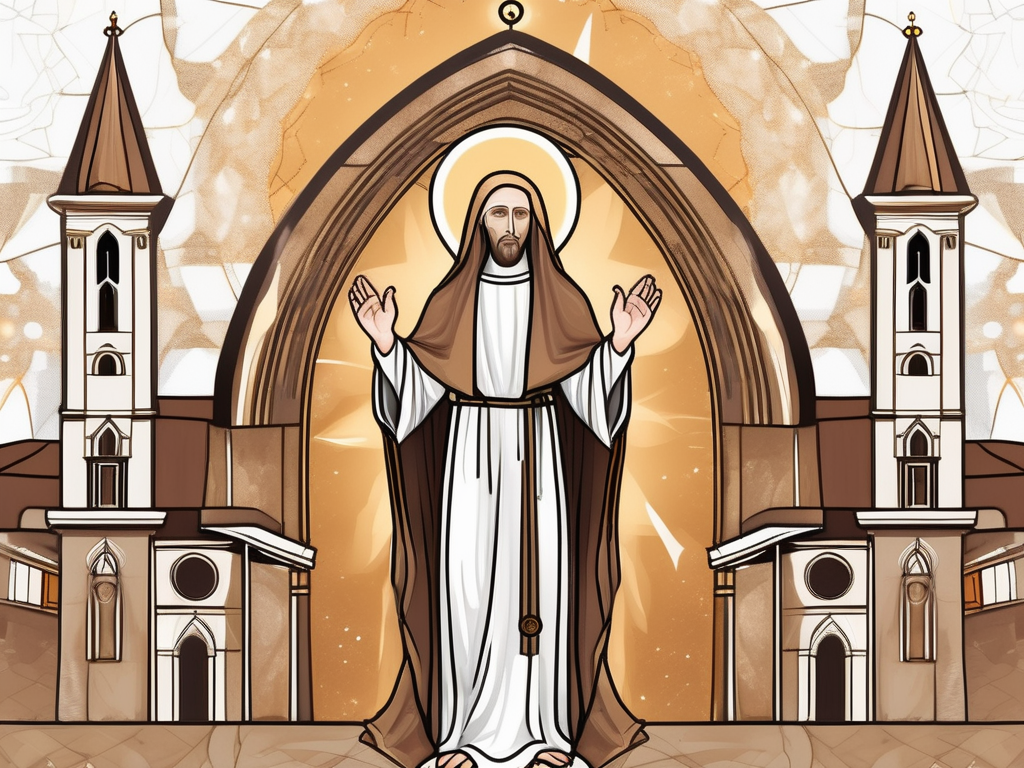Andrew the Apostle holds a significant place in the history of Christianity. His life, ministry, and martyrdom have left a lasting impact on the faith and continue to inspire millions around the world. In this article, we will explore the early life, calling and ministry, notable events, final years, and the enduring legacy of Andrew, the fisherman turned apostle.
Early Life of Andrew the Apostle
Andrew’s journey began with his birth and family background. Born in Bethsaida, a town in Galilee, he grew up in a humble family of fishermen. As the brother of Simon Peter, Andrew was brought up in a close-knit community deeply rooted in the traditions of Judaism and the fishing trade.
Andrew’s education and early influences played a pivotal role in shaping his character. Growing up, he would have received a basic education in Jewish law and customs. The spiritual teachings of his parents, coupled with the cultural and religious environment, laid a strong foundation for his future role as an apostle.
As a young boy, Andrew would have spent countless hours on the shores of the Sea of Galilee, observing his father and brother cast their nets into the water. He would have learned the art of fishing, honing his skills alongside his family members. The repetitive tasks of mending nets, rowing boats, and hauling in fish instilled in Andrew a sense of discipline, perseverance, and patience.
During his formative years, Andrew also had the opportunity to witness the bustling trade and diverse cultures that passed through Galilee. The region served as a crucial crossroads, connecting the Mediterranean Sea to the inland territories. Merchants, travelers, and scholars from various backgrounds would have frequented the area, exposing Andrew to a wide array of ideas, languages, and customs.
Andrew’s curiosity and open-mindedness led him to engage with these visitors, eagerly learning about their beliefs and traditions. This exposure to different cultures broadened his perspective and nurtured a spirit of tolerance and acceptance within him.
Furthermore, Andrew’s family was deeply religious, faithfully observing the Jewish customs and rituals. The Sabbath was a sacred time for the family, spent in prayer, reflection, and study of the Torah. These spiritual practices instilled in Andrew a reverence for God and a deep sense of devotion.
As Andrew grew older, he began to feel a calling from within, a sense that there was a greater purpose awaiting him. He sought wisdom from the local rabbis and scholars, engaging in discussions about the prophecies and the long-awaited Messiah. These conversations ignited a spark within Andrew, fueling his desire to seek out the truth and dedicate his life to serving God.
In his late teenage years, Andrew embarked on a pilgrimage to Jerusalem, joining the throngs of worshippers who flocked to the holy city. The experience was transformative, as he witnessed the grandeur of the Temple, participated in the religious ceremonies, and listened to the teachings of renowned scholars.
It was during this pilgrimage that Andrew first encountered John the Baptist, a charismatic preacher who was heralding the coming of the Messiah. Andrew was captivated by John’s words, sensing a profound spiritual connection. He became one of John’s disciples, immersing himself in the rituals of baptism and repentance.
Andrew’s time with John the Baptist deepened his faith and prepared him for the momentous encounter that would change his life forever. One day, as he stood by the banks of the Jordan River, Andrew heard John proclaim, “Behold, the Lamb of God!” Curiosity and anticipation filled his heart as he turned to see Jesus, the one whom John had spoken of.
With a mixture of awe and reverence, Andrew approached Jesus, engaging in a conversation that would mark the beginning of a lifelong journey. In that moment, Andrew recognized Jesus as the long-awaited Messiah, the Son of God. Filled with joy and conviction, he knew that he had found his purpose – to follow Jesus and become one of His closest disciples.
Andrew’s Calling and Ministry
A turning point in Andrew’s life occurred when he encountered Jesus Christ. It was during his early days as a disciple of John the Baptist that Andrew first encountered Jesus. However, it was Jesus’ invitation to “Come, follow me,” that forever changed Andrew’s life. He immediately recognized Jesus as the long-awaited Messiah and eagerly embraced his calling as an apostle.
Andrew’s journey as an apostle was filled with remarkable experiences and profound moments of faith. As one of the twelve apostles chosen by Jesus, Andrew played a vital role in spreading the teachings of Christ. Alongside his brother Peter, Andrew became a trusted confidant and disciple of Jesus. Together, they formed a strong bond, supporting and encouraging each other in their mission.
Throughout his time with Jesus, Andrew witnessed firsthand the many miracles performed by Jesus. He saw the blind receive sight, the lame walk, and the dead being raised to life. Each miracle deepened Andrew’s faith and strengthened his resolve to share the message of salvation with others.
Not only did Andrew witness miracles, but he also had the privilege of listening intently to Jesus’ teachings and parables. He sat at the feet of the greatest teacher the world has ever known, absorbing wisdom and divine knowledge. Andrew’s heart was captivated by the profound truths revealed by Jesus, and he eagerly shared these teachings with all who would listen.
Andrew’s ministry extended beyond his time with Jesus. After Jesus’ ascension, Andrew continued to proclaim the Gospel and establish communities of believers. He traveled far and wide, carrying the message of salvation to different regions and cultures. Andrew’s passion for sharing the love of Christ knew no bounds, and he fearlessly faced persecution and hardships for the sake of the Gospel.
Andrew’s legacy as an apostle and evangelist lives on to this day. His unwavering commitment to Christ and his tireless efforts to spread the Good News have inspired countless believers throughout history. Andrew’s calling and ministry serve as a reminder of the transformative power of encountering Jesus Christ and the profound impact one person can have in advancing God’s kingdom.
Notable Events and Contributions
Andrew’s time as an apostle was marked by numerous notable events and contributions. He played a significant role in many of the miracles performed by Jesus. Often portrayed as the apostle who brings others to Jesus, Andrew’s influence extended far beyond his immediate circle of disciples.
One of the most remarkable events in Andrew’s life was his encounter with the boy who had five barley loaves and two fish. When Jesus asked the disciples to find food to feed the large crowd, it was Andrew who brought the young boy to Jesus, offering the little food they had. Witnessing the miracle of the loaves and fishes, Andrew saw firsthand the power and compassion of Jesus, and this experience further strengthened his faith.
Not only did Andrew serve as a conduit for others to experience the love and teachings of Jesus, but he also shared his own wisdom and insights. His discourses on faith, love, and forgiveness resonated deeply with those who sought spiritual guidance. Andrew’s words were filled with compassion and understanding, offering solace to those burdened by their sins and struggles. His gentle and patient nature made him approachable, and many sought his counsel in times of need.
Andrew’s dedication to spreading the message of Christ contributed greatly to the early growth and development of the Christian community. He traveled extensively, preaching the gospel and establishing communities of believers. His journeys took him to various regions, including Greece, Asia Minor, and Scythia. Andrew’s tireless efforts to share the teachings of Jesus helped to lay the foundation for the future expansion of Christianity.
One of Andrew’s most significant contributions was his role in the conversion of his own brother, Simon Peter. It was Andrew who first introduced Peter to Jesus, telling him, “We have found the Messiah.” This pivotal moment marked the beginning of Peter’s journey as one of the most prominent apostles and leaders of the early Christian church. Andrew’s ability to recognize the potential in others and bring them to Jesus exemplifies his selflessness and commitment to spreading the good news.
Throughout his life, Andrew remained steadfast in his devotion to Jesus and his mission. He faced numerous challenges and hardships, but his unwavering faith and determination never wavered. Andrew’s legacy as an apostle continues to inspire believers to this day, reminding us of the power of faith, love, and the transformative message of Christ.
Andrew’s Final Years and Martyrdom
The final years of Andrew’s life were marked by immense challenges and unwavering faith. In the face of persecution, he fearlessly continued to preach the gospel and minister to those in need. His unwavering commitment to his faith and refusal to renounce his beliefs eventually led to his arrest and trial.
Despite the hardships he faced, Andrew’s passion for spreading the message of Christ never wavered. His tireless efforts to share the good news with others brought hope and inspiration to countless individuals. Andrew’s teachings resonated deeply with those who heard him speak, and his words touched the hearts of many.
As Andrew’s influence grew, so did the opposition against him. The authorities saw him as a threat to their power and sought to silence him. However, Andrew remained undeterred, boldly proclaiming the truth even in the face of danger.
Andrew’s trial culminated in his martyrdom. Tradition holds that he was crucified on an X-shaped cross, now known as the St. Andrew’s Cross. The cross became a symbol of his unwavering faith and sacrifice. It is said that as he hung on the cross, Andrew continued to spread the message of love and forgiveness, even to those who persecuted him.
The pain Andrew endured during his crucifixion was unimaginable. Yet, his devotion to Christ never wavered. He clung to his faith, finding strength in the knowledge that his suffering was not in vain. In his final moments, Andrew’s thoughts were not consumed by his own pain, but by the eternal hope he had in Christ.
Andrew’s martyrdom is seen as the ultimate sacrifice, a testament to his unwavering commitment to the faith he held dear. His life serves as a powerful example of courage, resilience, and dedication. Even in the face of death, Andrew’s unwavering faith and love for Christ shone brightly, inspiring generations to come.
Legacy of Andrew the Apostle
Andrew’s legacy extends far beyond his time on earth. His influence on early Christianity cannot be overstated. As one of the first disciples called by Jesus, he played a pivotal role in shaping the foundation of the Christian faith.
Saint Andrew is still revered and honored as the patron saint of various countries and causes. His symbol, the St. Andrew’s Cross, has become an internationally recognized emblem. Today, countless churches, schools, and organizations bear his name, a testament to the enduring impact of his life and ministry.
Moreover, Andrew’s story continues to inspire modern interpretations and impact. His unwavering faith, humility, and dedication to the teachings of Jesus serve as a beacon of hope for believers around the world. His life stands as a reminder that ordinary individuals, when called by God, can accomplish extraordinary things.
Influence on Early Christianity
Andrew’s role in the early development of Christianity cannot be understated. As one of the first apostles chosen by Jesus, he played a vital role in spreading the teachings of Christ. His fervent commitment and unwavering faith laid the groundwork for the growth and expansion of the faith during those early years.
Saint Andrew: Patronages and Symbols
Over the centuries, Saint Andrew has become the patron saint of various countries and causes. Scotland, Russia, and Greece hold a particular reverence for him, and his influence is evident in their culture, traditions, and religious practices. The St. Andrew’s Cross, with its distinctive X-shaped form, has become a universally recognized symbol associated with the apostle.
Modern Interpretations and Impact
In contemporary times, Andrew’s life and ministry continue to inspire countless individuals seeking spiritual guidance and purpose. His story, as retold through various artistic, literary, and musical works, reminds us of the transformative power of faith and the enduring relevance of his message. Andrew’s humble beginnings as a fisherman turned apostle resonate with those who recognize the potential for greatness within every individual.
In conclusion, Andrew the Apostle’s life and legacy serve as a testament to the transformative power of faith and the enduring impact of one individual’s devotion to Christ. From his early calling and ministry to his martyrdom and lasting influence, Andrew’s story continues to captivate and inspire generations. As we reflect upon his life, may we too find the strength and courage to embrace our own journey of faith and strive to make a difference in the world around us.












